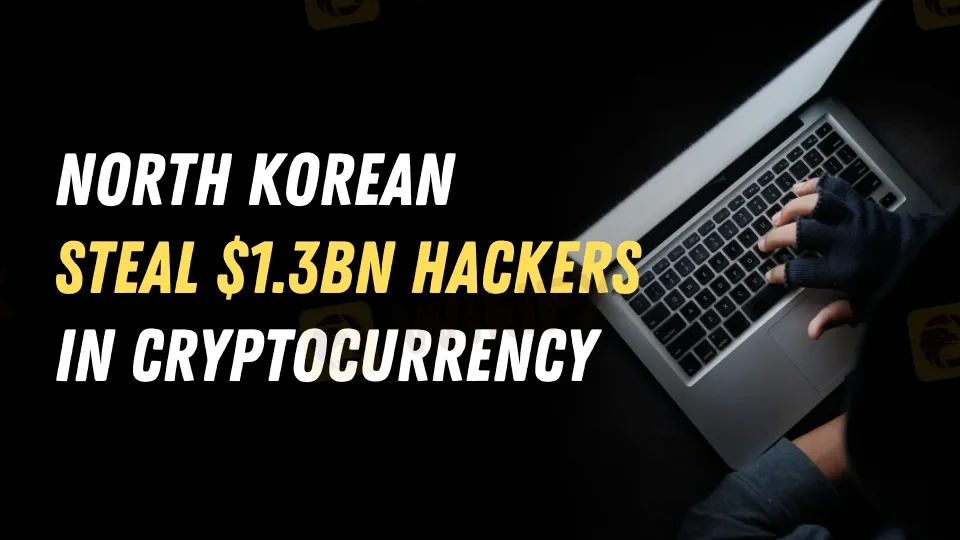简体中文
繁體中文
English
Pусский
日本語
ภาษาไทย
Tiếng Việt
Bahasa Indonesia
Español
हिन्दी
Filippiiniläinen
Français
Deutsch
Português
Türkçe
한국어
العربية
North Korean Hackers Steal $1.3bn in Cryptocurrency in 2024
Abstract:Over $2.2bn in cryptocurrency stolen in 2024, with North Korean hackers accounting for $1.3bn. Discover how cyber theft impacts the evolving crypto landscape.

According to Chainalysis, hackers have stolen $2.2 billion (£1.76 billion) in cryptocurrencies this year, which is a troubling trend. Surprisingly, more than half of this amount—$1.3 billion—has been traced back to North Korean cybercriminals.
Increasing Sophistication in Crypto Theft
The research focuses on how North Korean hackers are using increasingly advanced tactics to commit their crimes. Some of these people impersonate remote IT personnel in order to obtain access to sensitive systems and funds at cryptocurrency and technology companies.
These conclusions come as the price of Bitcoin has more than doubled by 2024. Analysts believe this spike is due in part to predictions that Donald Trump, the new US president, will be more favorable to cryptocurrencies than Joe Biden.
Crypto Theft on the Rise
Although the overall quantity of cryptocurrency stolen this year climbed by 21% over 2023, it remains below the record levels set in 2021 and 2022. According to Chainalysis, rising statistics highlight the need for stronger security measures in the cryptocurrency business.
“The rise in stolen crypto in 2024 underscores the need for the industry to address an increasingly complex and evolving threat landscape,” according to the research.

A large majority of this year's thefts were caused by compromised private keys, which are required for managing access to users' cryptocurrency assets. “Given that centralized exchanges manage substantial amounts of user funds, the impact of a private key compromise can be devastating,” according to the report.
Major Incidents in 2024
One of the most significant heists this year was the theft of $300 million in Bitcoin from the Japanese exchange DMM Bitcoin. Another major case involved the theft of $235 million from WazirX, India's top Bitcoin exchange.
These high-profile events highlight the fragility of centralized platforms, which are still ideal targets for cybercriminals.
North Koreas Strategy
The US administration has accused North Korea of employing cryptocurrency theft to avoid international sanctions. These stolen cash are thought to be used to fund the country's military initiatives and other operations. A federal court in St. Louis indicted 14 North Korean nationals last week for their roles in a plan to extort payments from US corporations and route them to Pyongyang.
In a related move, the US State Department has offered a reward of up to $5 million for information regarding the scam as part of its ongoing efforts to combat North Korea's cyber activities.
Final Thoughts
As cryptocurrency gains popularity, sophisticated hackers target it more frequently. The 2024 data is a sharp reminder of the significance of strong cybersecurity standards, particularly for centralized systems. There is potential for a safer digital economy when governments and industry leaders collaborate—but the fight against cyber risks is far from ended.

Disclaimer:
The views in this article only represent the author's personal views, and do not constitute investment advice on this platform. This platform does not guarantee the accuracy, completeness and timeliness of the information in the article, and will not be liable for any loss caused by the use of or reliance on the information in the article.
Read more

Russia to Fully Ban Crypto Mining in 10 Regions Starting January 1, 2025
Starting from January 1, 2025, Russia will implement a comprehensive ban on cryptocurrency mining in 10 regions for a period of six years. The ban will remain in effect until March 15, 2031.

Malaysian-Thai Fraud Syndicate Dismantled, Millions in Losses Reported
The Royal Malaysia Police (PDRM) has received 26 reports concerning the Nicshare and CommonApps investment schemes, both linked to a major fraudulent syndicate led by a Malaysian citizen. The syndicate’s activities came to light following the arrest of its leader by Thai authorities on 16 December.

Malaysian Pensioner Loses RM823,000 in Fake Investment Scam
A 61-year-old man from Batu Pahat, Malaysia, has fallen victim to a fraudulent investment scheme, losing a staggering RM823,000. Local authorities revealed that the man was lured through a Facebook advertisement promoting an investment opportunity with promises of substantial returns.

Malaysia’s Crypto Landscape: Adapting Amidst Global Ambitions
The United States is intensifying its efforts to become a global cryptocurrency hub under President-elect Donald Trump. Experts believe this move could prompt countries, including Malaysia, to reassess their regulatory approaches toward digital assets.
WikiFX Broker
Latest News
AIMS Broker Review
The Hidden Checklist: Five Unconventional Steps to Vet Your Broker
Russia to Fully Ban Crypto Mining in 10 Regions Starting January 1, 2025
YAMARKETS' Jingle Bells Christmas Offer!
Why is there so much exposure against PrimeX Capital?
Doo Financial Expands Regulatory Reach with Offshore Licenses in BVI and Cayman Islands
MTrading’s 2025 "Welcome Bonus" is Here
Doo Financial Obtains Licenses in BVI and Cayman Islands
CFI’s New Initiative Aims to Promote Transparency in Trading
Currency Calculator


